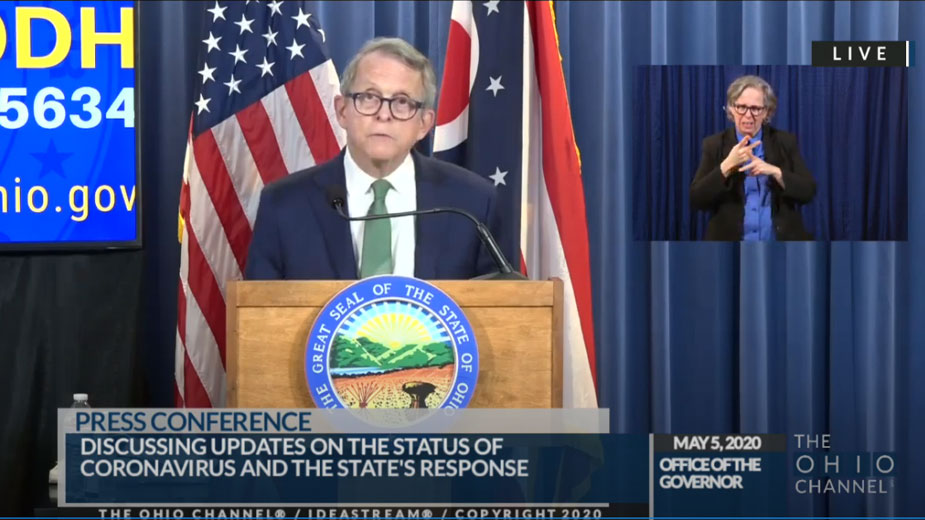DeWine Expects More COVID-19 Diagnoses as Economy Opens
YOUNGSTOWN, Ohio – As Ohio continues its phased reopening of businesses, Gov. Mike DeWine says he and other state officials are keeping an eye on the number of new cases of COVID-19.
“We tried to spread reopening over a period of time and not have not everything open on the same day,” DeWine said. “I expect to see the rate of infection go up because our testing is going up. As we open the economy, we will see more people test positive. This is a crucial period, but opening the economy is the right thing to do and not something we take lightly.”
DeWine also condemned threats of violence made over the weekend against Ohio House Minority Leader Emilia Sykes, D-Akron, and state Sen. Vernon Sykes, D-Akron.
“I was very disturbed to learn that threats of violence were made over the weekend. … It is wrong. It is reprehensible, and it is unconscionable to threaten someone with violence for doing the job they were elected to do,” DeWine said in a statement released Tuesday evening. “Simply put: hatred has no place in Ohio, and violence will not be tolerated.”
With pools, bowling alleys, gyms and fitness centers now open, local health department officials are hoping that residents and businesses respond appropriately as they did with the reopening of dine-in service for bars and restaurants.
“There were a handful of complaints that were received over the weekend in regards to social distancing and some employees potentially not wearing a face covering,” said Mahoning County Health Commissioner Ryan Tekac. “MCPH sanitarians will continue to investigate the complaints and will work with those businesses and employees in order to ensure compliance with ODH [Ohio Department of Health] orders and guidance.”
No citations were issued over the weekend in Mahoning or Trumbull counties. Tekac urged people to continue with social distancing, additional hand washing and to wear masks while in public.
Appearing on “Meet the Press” Sunday, DeWine said Ohioans are doing the right thing and that 90% of residents are wearing masks. After being asked about that figure, DeWine said he misspoke and the percentage is far lower.
“It’s certainly not at 90% and if that’s what I said, I misspoke. That certainly is an aspirational goal and I would to surpass it,” DeWine said. “Again, this is not about politics or whether you’re liberal or conservative issue. It’s an issue of how do I protect my neighbor, the people I love and people I don’t know. It’s about protecting each other and is as old as scripture – to love thy neighbor. It’s not perfect, but it is another layer. As more reality starts to sink in, more and more people will do this.”
DeWine also announced Congregate Care Unified Response Teams that will consist of the National Guard, local health departments and local and state Medicaid offices to begin testing this week in Ohio’s 960 senior care facilities. Of those 960 facilities, 200 have had a history of COVID-19, the disease spread by coronavirus.
The infectious virus has had a significant impact on long-term care facilities in the region. Since these statistics were first made available on April 15, 909 residents in Columbiana, Mahoning and Trumbull counties have tested positive, as well as 488 staff members. There have been 313 deaths locally.
Dr. Amy Acton, director of the Ohio Department of Health, reported that 63% of all deaths in Ohio have occurred in these congregate settings. The Associated Press put the percentage over 70%.
Medically trained members of Ohio’s National Guard will test staff and residents at Ohio’s eight Developmental Disability congregate centers will take place. The Ohio Department of Health reports 2,065 staff members and 611 residents at these centers have tested positive for COVID-19
On May 21, Mount Vernon Developmental Center nursing staff, in collaboration with the Knox County Department of Health, completed random COVID-19 testing on seven residents and five staff.
Asked why comprehensive testing in senior care facilities has taken three months to begin, DeWine said some testing has taken place where residents or staff members were found to be positive for COVID-19. Ohio has had a problem with capacity to test since the first cases of the virus in the state were diagnosed in early March.
“As capacity goes up more testing will be done. This is the first time we’ve been able to deploy testing efforts with this much focus,” he said.
Acton said 300,037 Ohioans have been tested as of May 26. The average number of weekly tests has fluctuated between 8,000 to 10,000 a week, far below DeWine’s projection of more than 20,000 tests by this time.
Copyright 2024 The Business Journal, Youngstown, Ohio.



